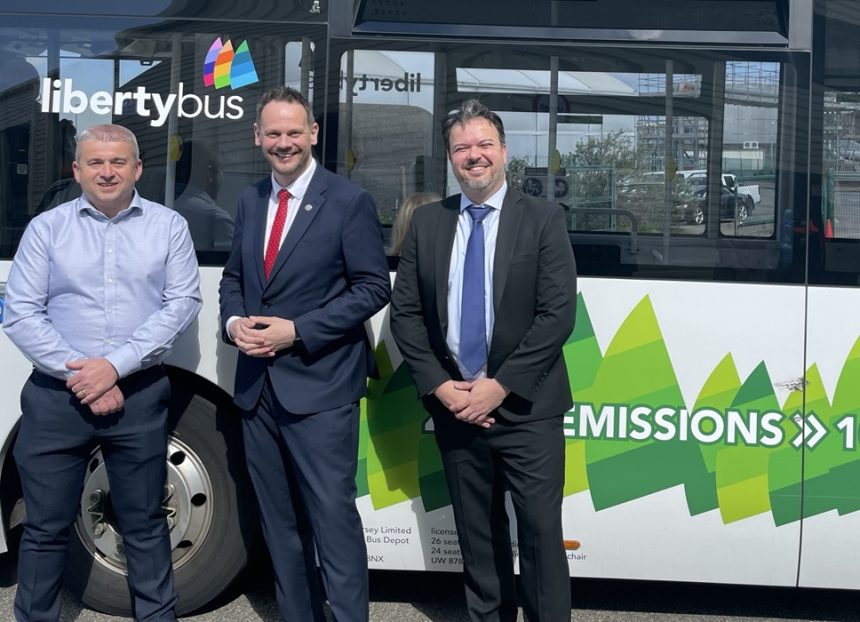Jersey’s franchised bus system, delivered by operator LibertyBus in partnership with the Jersey government, is being touted as a potential template for bus reform across England’s rural regions.
The Department for Transport (DfT) today (24 April) released statistics declaring that the network has achieved significant modal shift with 47% overall increase in bus patronage by the end of 2024. Jersey’s network “provides a blueprint” for rural and smaller authorities looking to deliver high-quality services and deliver growth through the Plan for Change, it adds.
Tower Transit business LibertyBus began operating the network in partnership with government in 2013. In that time the company has introduced five new routes and increased annual passenger journeys from 3.2 million to 5.3 million. This coincides with rising passenger satisfaction and reduction in car dependency during peak hours.
Local Transport Minister Simon Lightwood (pictured, centre) visited the island to observe the model in action and explore its relevance to the UK context. His visit coincides with progress through Parliament by the Bus Services (No. 2) Bill, which will empower local authorities to take greater control of bus networks through franchising or Enhanced Partnerships.
He says: “Here in beautiful Jersey, I’ve seen first-hand how well a franchised bus system can work when it puts passengers first.
“LibertyBus shows what’s possible when local leaders are empowered to take control — boosting ridership and delivering more frequent, reliable services. That’s exactly what we aim to achieve across England through our upcoming Bus Services Bill, which will expand access to opportunities and help put more money in the pockets of hardworking people.”
Adds Kevin Hart (pictured, left), Director of LibertyBus: “We’ve partnered with the Jersey Government for over 12 years, delivering a successful model where we take on the revenue risk while providing a core bus network.
“This allows us to focus on growing ridership and reinvesting profits into expanding services, including socially necessary routes, and we’ve managed to grow annual passenger journeys from 3.2 million to 5.3 million since 2013.
“With the government providing infrastructure and us delivering the expertise, the profit-sharing model ensures success is reinvested into the system. We’re proud this approach is being recognised in the Bus Service Bill and enjoyed showing the Minister how it works.”
Tower Transit Managing Director Samuel Ribeiro (pictured, right) notes how parent Kelsian Group has been operating bus franchise systems in Australia and around the world since 1995.
“We believe that the franchising model represents the future of the UK bus industry,” he says. “Its flexibility allows it to be adapted to both large urban centres and rural communities – Jersey stands as a great example of the latter.”
The government recently confirmed a £38 million funding boost to support the introduction of 319 new zero-emission buses across England. DfT says nearly £1 billion is being invested to upgrade bus infrastructure, expand services and introduce fare discounts as part of the wider Plan for Change.



























